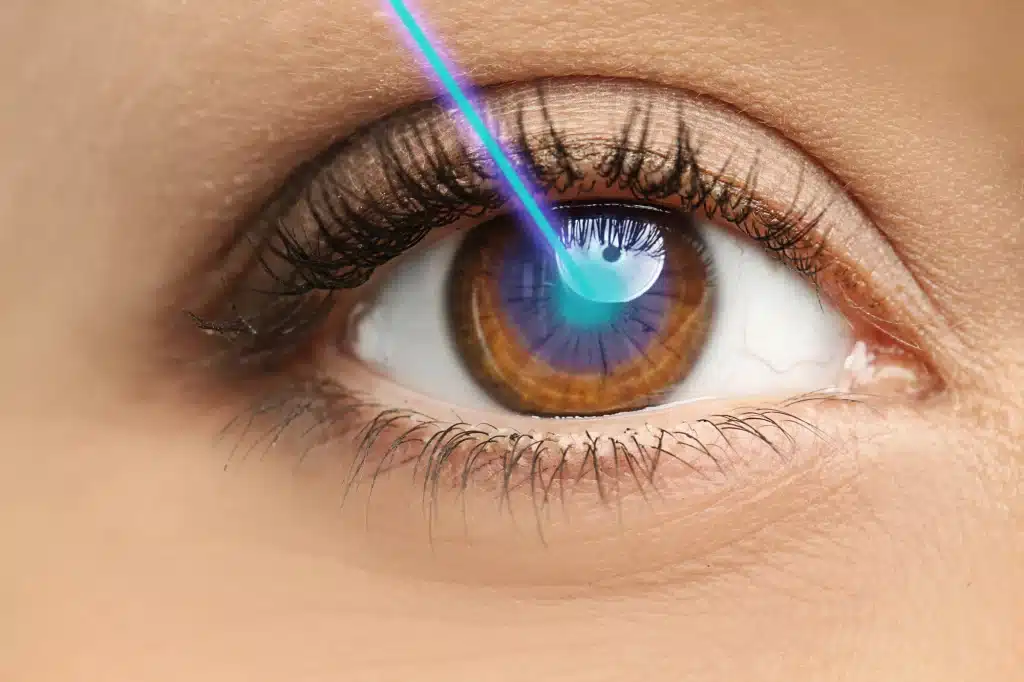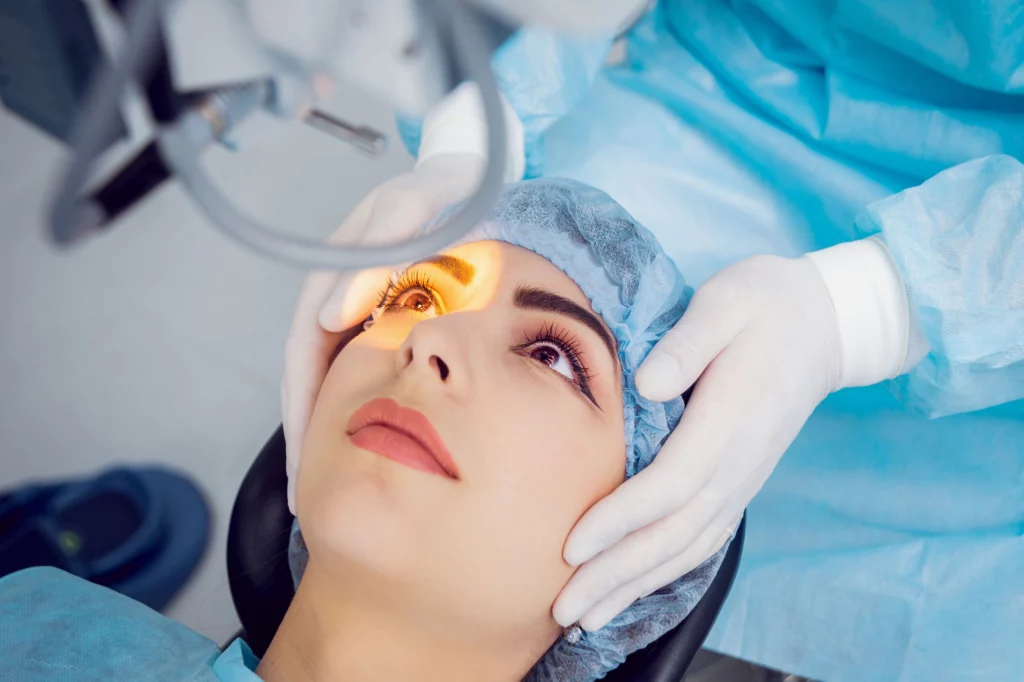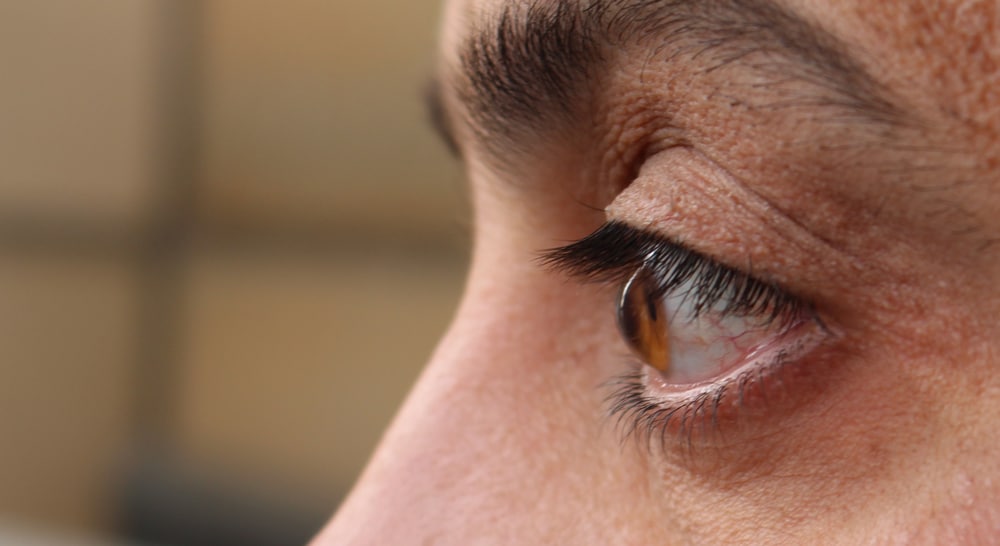Medically Reviewed by: Edward C. Wade, M.D., F.A.C.S.
Do’s and Don’ts after PRK Surgery
Patients who are considering corrective laser surgery, particularly PRK surgery, should familiarize themselves with some do’s and don’ts after PRK surgery to encourage a speedy and painless recovery.
Photorefractive keratectomy (PRK) is an outpatient laser procedure that usually only takes about fifteen minutes and produces 20/40 vision in 95% of those who elect to get it. If you are thinking about taking the next step in making poor vision an ailment of the past, keep reading to get an idea of what to expect during and after PRK surgery.
What to expect during PRK surgery
Is PRK eye surgery safe? The actual procedure is quite short, usually finishing up in just under 15 minutes. We understand that the experience can be nerve-wracking, so we offer an oral sedative for your comfort if you feel you could use it.
Your ophthalmologist will administer numbing drops in your eyes to reduce discomfort and work on one eye at a time, gently removing the top layer of your cornea (epithelium) and reshaping its irregularities with ultraviolet light. This beam is only used on the surface of your cornea and does not interfere with the corneal flap in the same way that LASIK does, it does however make the healing process a bit longer because the epithelium needs to regrow instead of just being reattached.
Continue reading: PRK vs LASIK recovery time
When the procedure is finished the surgeon will place a soft bandage contact lens on your eye, which both protects it and encourages healing of your cornea. You will be given eye drops (which you should use early and often over the following weeks) and consummate instructions before being driven home to rest.
The Don’ts: What can you not do after PRK surgery?
What you can do is rarely as important as what you cannot do when recovering from surgery. You probably have some questions like “Can you go outside after PRK surgery?” or “How soon can I drive after PRK surgery?” Here is a list of a few don’ts that will complicate recovery:
- Do not under any circumstances rub or touch your eyes: It can displace the bandage contact lens and land you back in the office for a replacement.
- Do not exercise or physically exert yourself: Perspiration can irritate and dry your already irritated and dry eyes.
- Do not drive until your doctor tells you it is safe to do so.
- Do not swim. This means no pools, no hot tubs, and no steam rooms. You may shower starting the day after your procedure but keep those eyes shut to make sure soap and water get nowhere near your eyes.
- Avoid dust, dirt, and smoke.
- Avoid eye makeup and skin creams around the eyes for a week after surgery.
- Avoid bright lights.
The Dos: Recovery tips for PRK surgery
The best way to ensure a comfortable recovery is to lay the groundwork. Inform your boss that you might need a couple of days off of work to ensure you are fully recovered before returning. It can take a few days for your vision to begin to clear up but if you are patient with your eyes and communicative with your doctor, you will have nothing to worry about. Here is some more practical advice:
- Follow up with your doctor: You can expect vision changes in the positive and negative as your eyes heal. It is normal for your eyes to feel dry for a few weeks following the procedure.
- Use your eye drops!
- Wear eye shields at night following the procedure.
- You may return to work once the bandage contact lens has been removed. If the bandage contact comes out do not attempt to put it back in and call your doctor.
- You will experience increased sensitivity to bright lights. Wear sunglasses, even during the day and indoors, for the first few days following the procedure.
- Consult your doctor before and after your procedure about meds to help with possible discomfort.
- Be aware of the PRK side effects so that you know when (and more importantly) when not to be alarmed. Things like dry eyes and blurry vision should not worry you.
Considering PRK surgery? The experts at Eye Center of Texas are here to help.
Our team at Eye Center of Texas has been working to give patients the eyesight that they deserve for years. With the help of surgeons like cornea specialist Dr. Yasir Ahmed, we are able to put the best minds and the most advanced techniques to work in service of your vision.
Now that you know your do’s and don’ts after PRK surgery contact us to see if you would be a candidate for PRK or LASIK, or visit PRK surgery Houston for more information on the procedure.
More Helpful Articles by Eye Center of Texas:
Related Articles
Financing Options Available
Apply today to find a financing option that meets your needs.
Our Locations
Houston/Bellaire
6565 W. Loop S., Suite 650Bellaire, TX 77401
Medical Office:
713-797-1010
Medical Fax:
713-357-7276
LASIK/Near Vision:
Office: 713-395-1515
Fax: 713-357-7278
Pasadena
4415 Crenshaw RoadPasadena, TX 77504
Medical Office:
281-977-8800
Medical Fax:
281-977-8877
Sugar Land
15200 S.W. Freeway, Suite 130Sugar Land, TX 77478
Medical Office:
281-277-1010
Medical Fax:
281-277-4504
Clear Lake
455 E. Medical Center Blvd., Suite 110Webster, TX 77598
Medical Office:
281-332-1397
Medical Fax:
281-282-9152
Katy
Greenhouse Medical Plaza2051 Greenhouse Road, Suite 110
Houston, TX 77084
Medical Office:
346-547-7070
Medical Fax:
281-214-2971
The Woodlands/Conroe
100 Medical Center Blvd., Suite 118Conroe, TX 77304
Medical Office:
936-647-1610
Medical Fax:
936-647-1620


